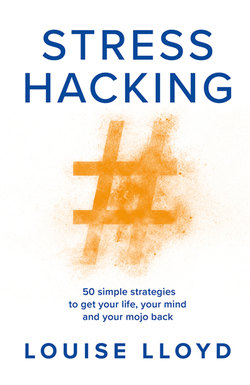Читать книгу Stresshacking - Louise Lloyd - Страница 19
На сайте Литреса книга снята с продажи.
ОглавлениеNegative stress causes us to become increasingly on edge. Under stress, we can become emotional, irrational and over-reactive. When stress is left unattended, our whole outlook becomes more negative; we begin to fear the worst in every situation and start to perceive everything as a threat. Eventually, everything has the potential to trigger us into an anxious, angry or withdrawn state.
Our nervous system’s response to stress is the same now as it would have been in survival days when faced with a life-threatening danger like a predator. We freeze, we fight or we run. Our nervous system doesn’t know the difference between a real-life threat and a perceived one. If we are worrying about something that isn’t even likely to happen, our nervous system will respond as if it is happening. If we are triggered by the stress of meeting a deadline, it becomes the predator. We will react in a fight, flight or freeze way. Have you ever noticed that when you’re nervous about something, like the day of a big presentation or taking an exam, that you are going to the loo every five minutes before it starts? Yep – that’s your nervous system emptying you out so you are ready to fight or run from the predator. Notice that your heart rate goes up when you are being given unwanted feedback? Yep – your heart is pumping blood around your body so you are ready-set-go to fight or run in response to it.
The fight response is reasonably apparent. It might show up as anything from mild irritation through to excessive acts of verbal or physical violence. It served us well when we needed to fight a predator trying to kill us but when it arises during road rage – well, it seems a bit excessive. But in that triggered, irrational, road-rage moment it can feel entirely justifiable to be aggressive – even though that’s not who we want to be. In a fight response we attack the situation or person we are having the problem with.
The flight response would obviously have been to run away from the predator. When faced with something that worries us, the flight response might look more like going quiet, denial, burying our head in the sand or withdrawing from life. In the flight response, we avoid the situation or person we are having the problem with.
The freeze response has a benefit in some situations; if we stay still for long enough if faced with a predator passing by, it might not see us and that could save our life. But the freeze response isn’t useful if we feel frozen to the spot when it would be better for us to take action.
We all have our ‘favourite’ triggered reaction; sometimes we combine them all depending on the situation. It is useful to identify your default response. I used to have quite an explosive reaction when triggered, which usually involved a deluge of tears after I had erupted. My unconscious default is to initially get verbally defensive before running for the hills and avoiding the person or situation altogether! Because I don’t feel comfortable with conflict, another unconscious default is to try to mediate whenever there is a problem between other people, which can mean I get involved in situations that are none of my business. Self-awareness brings many useful insights that can better inform our chosen response to life. I have found it really helpful to recognize my triggered stress reactions. I have also learnt that taking a few deep breaths to put space between how I might feel and how I choose to respond is invaluable, as is understanding why I have been triggered in the first place.
Gaining more control over our reactivity requires both in-the-moment action as well as longer-term action. Using the single-breath practice or the sigh-of-relief breath from #hack 4 will help in the immediate moment, while practising belly breathing daily for ten minutes will help you to be less reactive in general.
# The hack
What’s your triggered reaction in life? How does it vary from one situation to another?
Next time you notice that you are having a fight, flight or freeze reaction, can you take a few deep breaths? Give yourself a moment. Use the sigh-of-relief breath from #hack 4 to deactivate your fight-or-flight reactivity. Use the daily belly breath practice to become altogether less triggered in life.
